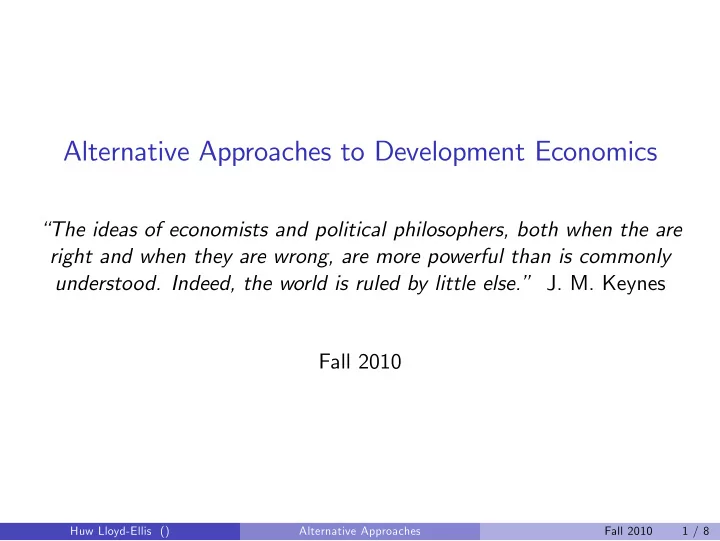

Alternative Approaches to Development Economics “The ideas of economists and political philosophers, both when the are right and when they are wrong, are more powerful than is commonly understood. Indeed, the world is ruled by little else.” J. M. Keynes Fall 2010 Huw Lloyd-Ellis () Alternative Approaches Fall 2010 1 / 8
Basic concepts Economic Rationality Bounded Rationality E¢ciency Coordination The Neoclassical market model Huw Lloyd-Ellis () Alternative Approaches Fall 2010 2 / 8
Development Planning Approach Development viewed as a sequence of stages Government intervention justi…ed by market failures : , ! Market Power , ! Externalities , ! Missing Markets , ! Coordination Problems Intervention scaled back as economy develops Criticisms of the Development Planning approach Huw Lloyd-Ellis () Alternative Approaches Fall 2010 3 / 8
Economic Institutions The humanly–devised constraints that structure incentives in economic transactions They consist of formal rules (statute law, common law, regulations) 1 informal constraints (conventions, norms of behavior) 2 the enforcement characteristics of both. 3 Determined by domestic/global, politics, religion, nature, etc. Change only gradually in response to economic/politicial pressures Examples Huw Lloyd-Ellis () Alternative Approaches Fall 2010 4 / 8
Chicago School Approach Although “institutions” often replace pure markets, they achieve the same e¢cient outcomes as predicted by neoclassical theory Private–sector creates institutions to minimize transactions costs : , ! costs associated with risk , ! coordination costs , ! motivation costs Intellectual basis for pure laissez faire , ! implies that policy-makers should largely ignore institutional details , ! but need well–de…ned property rights Criticisms of the Chicago School approach Huw Lloyd-Ellis () Alternative Approaches Fall 2010 5 / 8
Asymmetric Information Moral Hazard (hidden actions) , ! one party cannot observe or infer the actions of another Adverse selection (hidden information) , ! one party cannot observe/infer characteristics of another Design of institutions governing transactions re‡ects these problems Huw Lloyd-Ellis () Alternative Approaches Fall 2010 6 / 8
New Institutional View Emphasizes the role and endogeneity of institutions , ! develops a positive theory of economic institutions Asymmetric information results in fundamental market failures , ! private sector creates “institutions” to deal with them, but still ine¢cient , ! standard forms of government intervention may fail Outcomes depend on institutional arrangements and the distribution of wealth Huw Lloyd-Ellis () Alternative Approaches Fall 2010 7 / 8
The Culturalist Position Economist’s view: variation in socio–economic outcomes due to variation in incentives ) change underlying institutions ! change individual behaviour ! better outcomes Culturalist’s view: variation in socio–economic outcomes due to social conditioning ) change underlying culture of society ! achieve better outcomes for given institutions Huw Lloyd-Ellis () Alternative Approaches Fall 2010 8 / 8
Recommend
More recommend